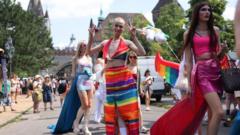**Budapest is set to host a Pride event on June 28 regardless of police opposition, signaling a showdown between city officials and the national government aimed at LGBTQ+ rights and freedom of assembly.**
**Budapest's Pride March Faces Police Ban, Mayor Promises Resilience**

**Budapest's Pride March Faces Police Ban, Mayor Promises Resilience**
**Amid rising tensions, Budapest's LGBTQ+ Pride march receives a ban from authorities, but the city's mayor remains committed to the event’s progression.**
In a bold stand against police intervention, Budapest's liberal Mayor Gergely Karacsony has vowed to host the annual LGBTQ+ Pride march on June 28, despite the authorities' ban. The event, termed a "Day of Freedom" by the mayor, emphasizes a commitment to inclusivity amid ongoing clashes with the nationalist government led by Prime Minister Viktor Orban.
The tension builds as Orban's government has been openly critical of Pride events, with a recent order declaring this year's march prohibited under newly imposed restrictions that allegedly prioritize child protection over freedom of expression. Amid rising scrutiny over Hungary's approach to LGBTQ+ rights, the mayor asserted his intention to proceed with the event, differentiating it from traditional Pride celebrations by removing explicit depictions of sexuality.
Mayor Karacsony challenged the police's authority to impose a ban, claiming such restrictions infringe upon the rights of assembly and expression. “This is an event organized by the city, and we will not let the police dictate otherwise,” he stated confidently.
The city is expected to draw participation from thousands, both locals and international supporters, amidst protests from the government that frame Pride as inappropriate for children. Critics, including human rights organizations, have labeled the government's stance as an affront to basic rights and a calculated political maneuver aimed at consolidating power.
In response to police warnings, human rights advocates, including the Hungarian Helsinki Committee, have advised prospective participants to challenge any fines in a bid to overwhelm the legal system should enforcement attempts increase. The unfolding situation unveils a significant struggle in Hungary regarding LGBTQ+ rights and civil liberties, which resonates beyond borders in the current global dialogue on freedom and acceptance.
The tension builds as Orban's government has been openly critical of Pride events, with a recent order declaring this year's march prohibited under newly imposed restrictions that allegedly prioritize child protection over freedom of expression. Amid rising scrutiny over Hungary's approach to LGBTQ+ rights, the mayor asserted his intention to proceed with the event, differentiating it from traditional Pride celebrations by removing explicit depictions of sexuality.
Mayor Karacsony challenged the police's authority to impose a ban, claiming such restrictions infringe upon the rights of assembly and expression. “This is an event organized by the city, and we will not let the police dictate otherwise,” he stated confidently.
The city is expected to draw participation from thousands, both locals and international supporters, amidst protests from the government that frame Pride as inappropriate for children. Critics, including human rights organizations, have labeled the government's stance as an affront to basic rights and a calculated political maneuver aimed at consolidating power.
In response to police warnings, human rights advocates, including the Hungarian Helsinki Committee, have advised prospective participants to challenge any fines in a bid to overwhelm the legal system should enforcement attempts increase. The unfolding situation unveils a significant struggle in Hungary regarding LGBTQ+ rights and civil liberties, which resonates beyond borders in the current global dialogue on freedom and acceptance.


















